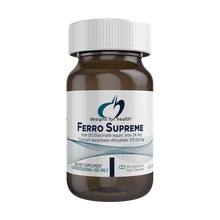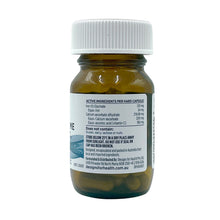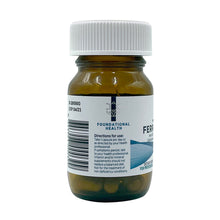Designs for Health's Ferro Supreme 30 capsules
Aids healthy red blood cell production
- Provides 24mg iron from Iron Bisglycinate per capsule
- Contains 180mg ascorbic acid to facilitate iron absorption
- Supports haemoglobin synthesis
- Supports blood heath
- Supports oxygen transport to body tissues
- Maintains energy production
- Vegan friendly
Servings per bottle: 30 vegetarian hard capsules
Directions for use
Adults: Take 1 capsule per day or as directed by your healthcare professional.
Allergen Information
No added: Gluten, nuts, soy, dairy, or lactose
Product Education:
Iron is an essential mineral functioning mainly in the transport and storage of oxygen throughout the body. Around 2-4gm of iron exists in the body, the majority in haemoglobin (65%), in storage in the liver and macrophages (20%), and in storage in myoglobin (10%). The remainder resides functionally in enzyme complexes.
Iron is found in dietary sources in both heme and non-heme forms. Heme iron exists as a complex with protoporphyrin and is available in animal products such as red meat, poultry and seafood. Non-heme iron is found in both animal and plant sources including green leafy vegetables, legumes and seeds, and is available as free or weakly bound iron. Non-heme iron has an affinity for binding complexes such as phytates or polyphenols. It is, therefore, less bioavailable than heme iron.
Blood health
Iron is found largely in the haemoglobin protein of erythrocytes which functions as a carrier of oxygen throughout the system. As it is a crucial constituent of haemoglobin, iron is essential not only for its production but also for optimal erythropoiesis.
Energy production
Iron also functions as an iron-sulphur complex in enzymes involved in the electron transport chain and in the Krebs cycle, enabling optimal enzyme function and mitochondrial respiration. Iron, therefore, plays an essential role in energy production.
Immune Function
Iron is enzymatically involved in DNA synthesis making it a vital nutrient for cell growth and division. One of the major functions affected by this action is immune cell production, particularly of the T-lymphocytes.
Iron Bisglycinate and Ascorbic Acid
Iron bisglycinate is an iron chelate that contains around 20% iron. It is water-soluble and largely resistant to acidic fluctuations between pH 2-6. This retains the compound’s solubility and protects it from dietary inhibitors such as phytates and polyphenols, ensuring high bioavailability of the compound.
Vitamin C (in the form of ascorbic acid) is a nutrient that, when taken in combination, can improve the solubility and therefore bioavailability of non-heme iron by up to 39%.
Excipients
Maltodextrin, Microcrystalline cellulose, Magnesium stearate, Colloidal anhydrous silica, Citric acid, Hypromellose, Purified Water
Prescribing Information (considerations, contraindications)
- Levodopa: Iron might decrease levodopa levels by reducing its absorption, separate doses of iron and levodopa as much as possible.
- Levothyroxine: Iron might decrease levothyroxine levels by reducing its absorption. Advise patients to separate levothyroxine and iron doses by at least 2 hours.
- Methyldopa: Iron might decrease methyldopa levels by reducing its absorption. Advise patients to separate methyldopa and iron doses by at least 2 hours.
- Antibiotics (Quinolone, Tetracycline): Iron might decrease levels of tetracycline antibiotics by reducing their absorption. Advise patients to separate quinolone antibiotics and iron doses by at least 2 hours. Separate 2 hours before or 4 hours after tetracycline antibiotics.
- Calcium: Calcium can decrease iron absorption. It is recommended to take calcium and iron supplements at different times of the day.
- Zinc: Iron and zinc can interfere with each other’s absorption when taken on an empty stomach. When high supplemental doses of zinc are taken on an empty stomach there is a measurable reduction in iron absorption, and high supplemental doses of nonheme iron taken on an empty stomach can reduce zinc absorption, especially when dietary mineral intake is low.
- Achlorhydria: Decreased stomach acidity may impair iron absorption.
- Hemodialysis: Supplemental iron absorption is decreased in people requiring chronic hemodialysis.
- Hemoglobin diseases: Iron overload is likely to occur in people with hemoglobinopathies or other refractory anemias erroneously diagnosed as iron deficiency anemia.
Once supplements leave our store they cannot be returned or refunded. Please choose carefully.







